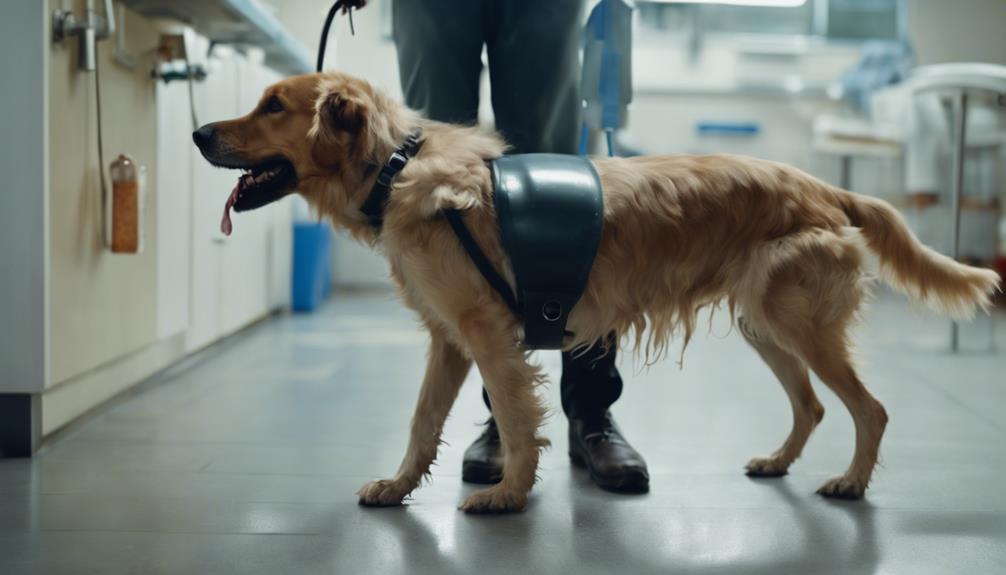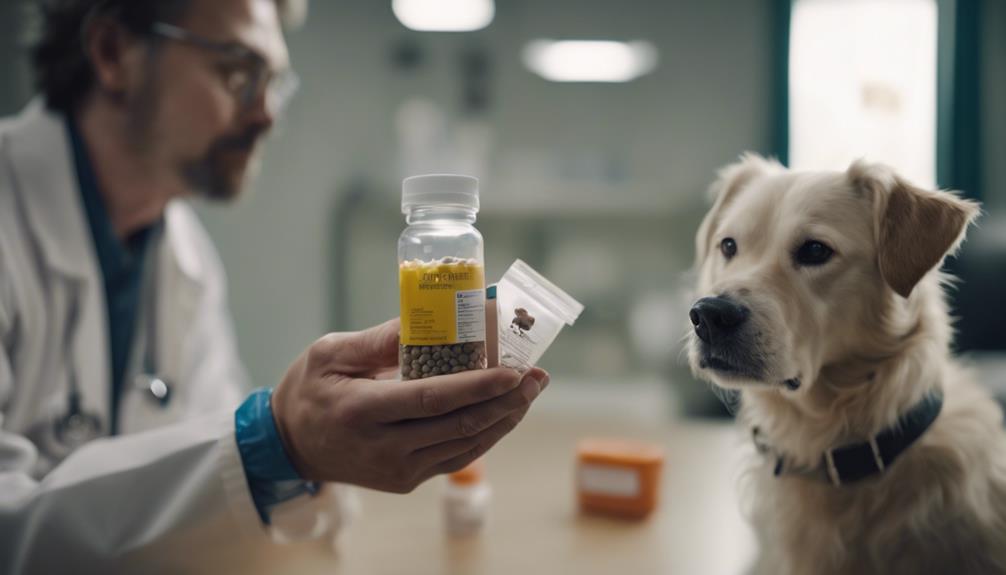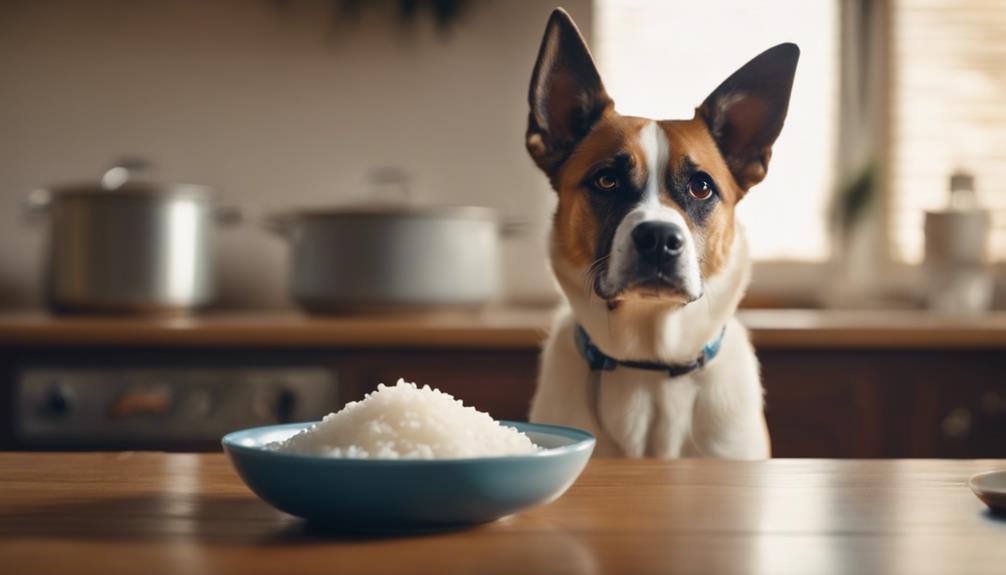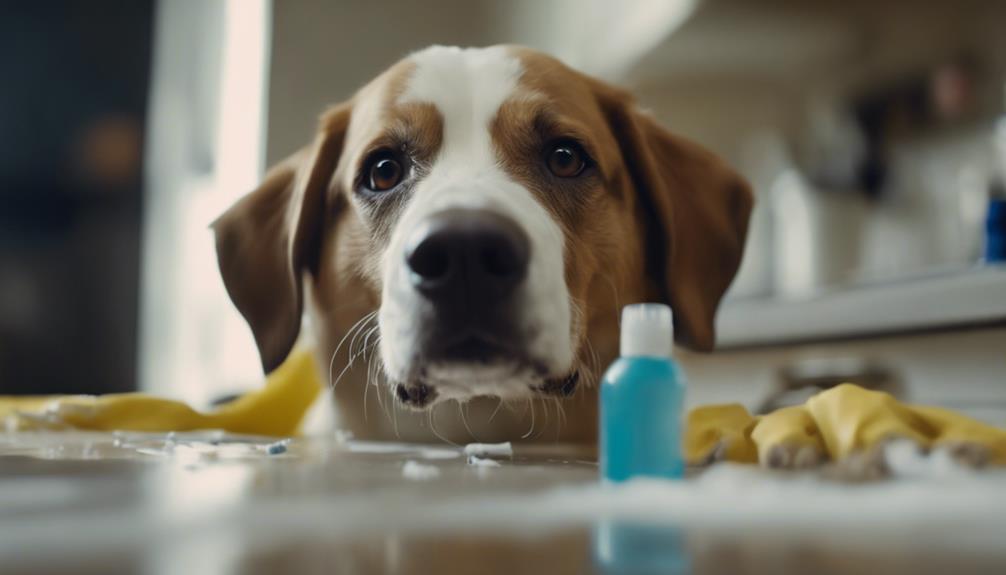When it comes to our canine companions, keeping a close eye on their bathroom habits can offer valuable insights into their overall health. Diarrhea in dogs is a common concern among pet owners, often signaling underlying issues that require attention.
From changes in stool consistency to unusual colors, the clues left behind in your pup's poop can speak volumes about their well-being. Understanding what these signs mean and how to respond appropriately is vital for ensuring your furry friend remains happy and healthy.
So, the next time you scoop the poop, pay attention – it might just hold the key to your pup's health.
Key Takeaways
- Poop color indicates health status, from brown to red.
- Certain signs require immediate vet attention for dogs with diarrhea.
- Treatment involves identifying causes, supportive care, and medication.
- Home remedies like fasting and bland diets can help manage diarrhea.
Common Causes of Diarrhea in Dogs
Diarrhea in dogs can stem from various common causes such as dietary indiscretion, changes in diet, stress, parasites, and viral infections. Dietary indiscretion refers to the consumption of unsuitable or excessive food items. Abrupt changes in diet can disrupt the gastrointestinal system, leading to loose stools.
Stress, whether from environmental changes or emotional factors, can trigger digestive upsets in dogs. Parasites like worms or protozoa can also cause diarrhea by irritating the intestines. Additionally, viral infections such as parvovirus or distemper can manifest as gastrointestinal issues.
Understanding these common causes is crucial in managing and preventing diarrhea in dogs, highlighting the importance of proper diet, stress management, parasite control, and vaccination protocols.
Interpretation of Poop Color
Understanding the significance of different colors of feces can provide valuable insights into a dog's gastrointestinal health. The color of a dog's stool can often indicate potential issues such as diet changes, infections, or even internal bleeding. Here is a simple guide to interpreting your pup's poop color:
| Stool Color | Possible Causes |
|---|---|
| Brown | Normal, healthy digestion |
| Brown with White Flecks | Bone fragments or excess calcium |
| Yellow or Orange | Liver or gallbladder issues |
| Green | Consumed grass or rapid transit |
| Red or Red Streaks | Blood in the stool, possibly from bleeding in the colon |
Identifying Signs of Health Emergency

Upon observing your dog's stool, it is crucial to be vigilant for signs of health emergencies that necessitate immediate veterinary attention.
Certain red flags indicating a health emergency include diarrhea persisting for more than two days, particularly if accompanied by vomiting. For unvaccinated dogs or puppies, diarrhea can quickly escalate into a severe issue.
Additionally, if you notice bloody or black stool, or if the stool appears grey and greasy, it's imperative to seek veterinary care promptly. These signs may indicate underlying health issues that require urgent intervention to safeguard your dog's well-being.
If any of these symptoms are present, it is recommended to contact your veterinarian without delay for a thorough evaluation and appropriate treatment.
Factors Requiring Veterinary Attention
Seeking veterinary attention is crucial for various factors related to your dog's health and well-being. Abdominal pain in dogs with diarrhea can indicate a more serious underlying issue and requires prompt evaluation by a veterinarian.
Ingestion of toxic substances, such as certain foods or chemicals, can lead to severe gastrointestinal distress and necessitates immediate medical intervention. If you are uncertain about the severity of your dog's condition or if the diarrhea persists despite home care efforts, consulting a veterinarian is recommended.
Bringing a stool sample to the vet can aid in the diagnostic process, enabling the vet to identify potential causes such as parasites or bacterial infections. Additional diagnostics like blood work and radiographs may be necessary to determine the appropriate treatment plan for your dog's diarrhea.
Treatment Strategies for Dog Diarrhea

Prompt veterinary evaluation is essential for determining appropriate treatment strategies to address dog diarrhea effectively. To manage diarrhea in dogs, consider the following strategies:
- Identify the underlying cause: Pinpointing the reason for the diarrhea is crucial for targeted treatment.
- Provide supportive care and hydration: Keeping your pup hydrated is key to their recovery.
- Follow vet recommendations for medication: Administer any prescribed medications faithfully to aid in resolving the issue.
- Monitor recovery progress: Keep a close eye on your dog's condition to ensure they are improving as expected.
Medications for Diarrhea Management
Effective management of diarrhea in dogs often involves the administration of specific medications tailored to address the underlying cause and alleviate symptoms. Dewormers are crucial for treating intestinal parasites, which can be a common cause of diarrhea.
Antidiarrheal medications like metronidazole (Flagyl) or tylosin (Tylan) can help reduce diarrhea and its associated discomfort. Probiotics are also beneficial for preventing diarrhea by restoring the balance of good bacteria in the gut.
Quality supplements recommended by veterinarians can support overall gastrointestinal health and aid in the recovery process. When using medications for diarrhea management in dogs, it is essential to follow the veterinarian's instructions carefully to ensure the best outcomes for your furry friend.
Effective Home Remedies for Diarrhea

When managing diarrhea in dogs at home, implementing remedies that promote gastrointestinal health is essential. Here are some effective home remedies to help your pup recover:
- Fasting: Give your dog a break from food for 12-24 hours to allow their digestive system to rest.
- Bland Diet: Offer options like rice, pumpkin, chicken, pasta, potatoes, or lean hamburger to soothe their stomach.
- Prebiotics and Probiotics: Introduce these supplements to help restore the balance of good bacteria in the gut.
- Prescription Foods: Consider special gastrointestinal formulas recommended by veterinarians for easy digestion.
Preventive Measures for Diarrhea
Implementing preventive measures can significantly reduce the occurrence of diarrhea in dogs and contribute to their overall gastrointestinal health. Some key preventive measures include maintaining a consistent and balanced diet for your furry companion.
Avoid sudden dietary changes and ensure that your dog is not consuming any harmful or spoiled food items. Regular exercise and maintaining a stress-free environment can also aid in preventing diarrhea.
Additionally, providing clean and fresh water at all times is essential for your dog's digestive health. Probiotics can be beneficial in maintaining a healthy gut flora and preventing gastrointestinal issues.
Consult with your veterinarian to determine the best preventive measures tailored to your dog's specific needs and health status.
Quick Cleanup Tips for Accidents

To maintain a hygienic environment and promptly address unexpected messes, pet owners must be equipped with efficient methods for cleaning up after their dogs, especially when accidents occur. Here are some quick cleanup tips to help you handle such situations effectively:
- Act Quickly: Time is of the essence; clean up the mess promptly to prevent stains and odors from setting in.
- Use Pet-Safe Cleaning Products: Choose cleaning products that are safe for pets to avoid any harmful reactions or ingestion.
- Bathing Your Dog: If your dog has diarrhea stuck to their fur, consider giving them a gentle bath to remove the mess thoroughly.
- Dispose of Waste Properly: Make sure to dispose of waste in a proper and sanitary manner to maintain a clean living environment for you and your dog.
Additional Articles on Pet Health
Exploring a range of informative articles on pet health can provide valuable insights into caring for your furry companions. Here are some recommended articles to further enhance your knowledge on pet health:
| Article Title | Description |
|---|---|
| Common Illnesses in Cats | Learn about common health issues in cats and how to recognize symptoms early on. |
| Dental Care for Dogs | Understand the importance of dental hygiene in dogs and how to maintain their oral health. |
| Exercise Benefits for Pets | Discover the positive impact of regular exercise on your pet's overall well-being. |
| Mental Stimulation for Small Animals | Explore ways to provide mental enrichment for small pets like rabbits, guinea pigs, and more. |
| Nutrition Tips for Senior Dogs | Get insights on tailored nutrition for aging dogs to support their health and vitality. |
Importance of Probiotics for Dogs

When considering the well-being of your canine companion, understanding the importance of probiotics in maintaining your dog's digestive health is crucial. Probiotics are beneficial bacteria that can help support your dog's gut health in various ways:
- Balancing Gut Flora: Probiotics can help restore the natural balance of good bacteria in your dog's digestive system.
- Strengthening Immune System: By promoting a healthy gut, probiotics can boost your dog's immune system.
- Improving Digestion: Probiotics aid in breaking down food and absorbing nutrients effectively.
- Reducing Diarrhea Risk: Regular use of probiotics can help prevent and manage episodes of diarrhea in dogs.
Integrating probiotics into your dog's daily routine can contribute significantly to their overall well-being and digestive health.
Role of Diet in Digestive Health
The dietary composition plays a pivotal role in influencing the digestive health of dogs. A balanced and appropriate diet is crucial for maintaining a healthy gastrointestinal system in canines. High-quality dog food that is rich in essential nutrients, easily digestible proteins, and fibers can promote good digestive function.
Avoiding sudden changes in diet and providing a consistent feeding schedule can help prevent digestive upsets like diarrhea. Additionally, incorporating probiotics and prebiotics into the dog's diet can support a healthy gut flora balance, aiding in digestion and overall well-being.
Consulting with a veterinarian for personalized dietary recommendations tailored to the dog's specific needs and digestive sensitivities is essential for promoting optimal digestive health and preventing issues like diarrhea.
Conclusion
In conclusion, monitoring your dog's bowel movements and understanding the causes of diarrhea are essential for maintaining their health. Recognizing poop color indicators and signs of health emergencies can help identify potential issues early on.
Prompt veterinary attention is crucial for persistent diarrhea or presence of blood in stool. Treatment strategies, including medications, home remedies, and preventive measures, play a vital role in supporting your dog's digestive health effectively.




